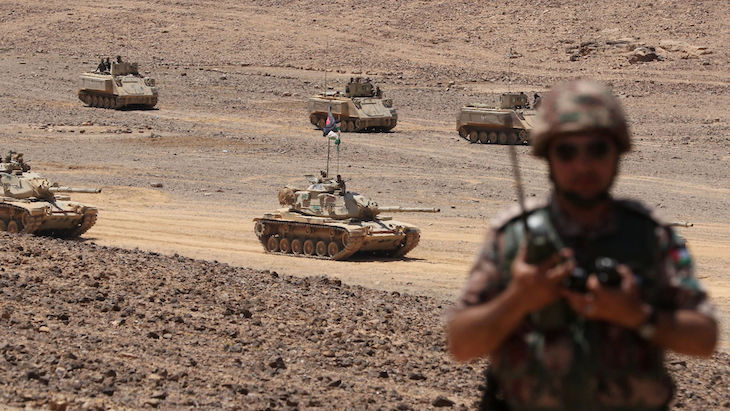The drone attack on a US base in Jordan that killed three American troops and injured dozens risks bringing one more country into the orbit of the war between Israel and Hamas.
President Joe Biden has blamed “Tehran-backed militants” operating in Syria and Iraq for the strike on Tower 22, a US base on Jordan’s border with Syria, and has promised reprisals. Iran has denied any involvement: Tehran prefers to let its proxies do its dirty work. Watching on nervously is Jordan.
Iran, whatever its denials, has much to gain by sowing instability in Jordan
Iranian-backed militias in Syria, Iraq and Yemen have now launched more than 150 attacks on US positions in the region since the Gaza conflict began in October. The attack in Jordan is a calculated and dangerous escalation in an already highly unpredictable conflict. Striking US forces at a well-protected military base is the clearest way of signaling that no American target is beyond the reach of the militias. In choosing a site in Jordan, the militias are hitting a country that is one of America’s staunchest allies in the region — a way of punishing those who align themselves with Washington.
What of the Jordanians? The last thing Amman wants — or needs — is to be caught in the middle of a wider confrontation between Iran and the United States. It has more to fear than most because of its shared borders with Iraq and Syria — both states in which Iran’s proxies and well-armed militias operate with seeming impunity. There is no denying that Jordan — resource-poor and surrounded by much more powerful neighbors — is in a precarious position.
Iran, whatever its denials, has much to gain by sowing instability in Jordan. If it can do so without being directly blamed, so much the better. It has been flexing its muscles throughout the Middle East ever since the Iraq war two decades ago. The toppling of Saddam Hussein — a Sunni Muslim leader — allowed Tehran new sway in the affairs of Iraq.

It is no coincidence that since the war in Gaza started, Iranian-backed militias have conducted regular attacks on US forces in Iraq. At the same time, Iranian influence continues to grow in Syria: Tehran has been instrumental in helping the Syrian leader Bashar al-Assad stay in power. A variety of Iranian-backed militias also hold sway on Syria’s southern border with Jordan. It makes for a volatile situation, with growing fears in Jordan that the country’s security is under threat from myriad forces. King Abdullah has voiced concern about a fresh displacement of Palestinians to the kingdom in the wake of the Gaza conflict. Jordan is already home to a large number of Palestinians dispossessed from their land when Israel was created in 1948.
Jordan is asking for more military support from America to help combat the activities of the Iranian-backed militias on its borders as well as allay its concerns about Iranian motives in the long term. Washington last stationed Patriot defense missiles in Jordan in 2013 when the conflict in Syria prompted concerns about a wider regional war. US military assistance to Jordan is worth more than $600 million annually.
Jordan’s fate is inextricably tied to wider western interests in the region. In the domino politics of the Middle East, Jordan cannot afford to be dragged into a regional war. That would be a disaster for the West — which is exactly why the country is in the sights of those who wish to ignite a wider Middle East conflagration.
This article was originally published on The Spectator’s UK website.
























